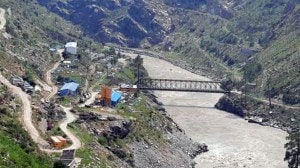Olmert has majority, names Cabinet
After three weeks of negotiations, interim Prime Minister Ehud Olmert on Monday put together a coalition government that backs his plan to pull out of parts of the West Bank and draw Israel8217;s final borders by 2010.

After three weeks of negotiations, interim Prime Minister Ehud Olmert on Monday put together a coalition government that backs his plan to pull out of parts of the West Bank and draw Israel8217;s final borders by 2010.
Olmert announced key Cabinet appointments, naming Tzipi Livni, a pragmatic jurist and rising star in Israeli politics, as Vice-Premier and Foreign Minister. Livni had served as acting Foreign Minister in recent months. Outgoing Defense Minister Shaul Mofaz, who only belatedly threw his support behind Olmert, got a relatively minor portfolio.
In the West Bank town of Tulkarem, meanwhile, Israeli soldiers shot and killed a Palestinian woman while trying to arrest an Islamic Jihad militant hiding in the woman8217;s apartment building, the Army said. The soldiers fired at the house when they saw suspicious movement, killing Itaf Zalat, 41, and wounding her two daughters, the army said. The army apologised for the shooting and said it was investigating.
The woman8217;s husband, Yousef, 48, said the shots came without warning. 8216;8216;They shot at a home with people living in it, civilians,8217;8217; he said. 8216;8216;We have done nothing. They didn8217;t even knock on the door to tell me to get out. I would have gotten out.8217;8217;
In Israel, coalition talks ended on Sunday when Olmert informed President Moshe Katsav that he had formed a government that controls a majority in parliament. Olmert8217;s Kadima Party won a March election, but did not win enough seats in the 120-member parliament to rule alone. The agreement signed with the ultra-Orthodox Shas party late on Sunday, along with support from the Left-centre Labour Party and from the Pensioners8217; Party, gives Olmert a majority of 67 in parliament.
Labour and the Pensioners are expected to support Olmert8217;s West Bank plan without hesitation. However, Shas insisted that it will not be forced to commit to the programme which would require the dismantling of dozens of Jewish settlements. Olmert is not expected to launch the plan for another year to 18 months.
If Shas were to back the pullout, the party could alienate its hard-line constituency, which opposes handing over parts of the West Bank to the Palestinians. 8220;The settlers will not forget that Shas turned its back on them at this difficult time, as Olmert8217;s sword lies on the neck of the entire settlement enterprise,8221; Yitzhak Levy, a lawmaker from the pro-settler National Religious Party, was quoted as saying in the Israeli daily Yediot Ahronot.
But the Meretz Party, which has so far not joined Olmert8217;s government, could give parliamentary support to a West Bank withdrawal if Shas pulls out in coming months.
In an initial push to draw Israel8217;s borders, Olmert8217;s Cabinet modified the route of the separation barrier on Sunday, putting thousands of Palestinians on the West Bank side of the structure. Israel began construction of the barrier four years ago, saying it needed to keep suicide bombers out of the country. Olmert says the barrier will serve as the basis for Israel8217;s final border with the West Bank, which Israel won from Jordan in the 1967 Middle East war.
Key Cabinet members
VICE-PREMIER AND FOREIGN MINISTER: Tzipi Livni, 47. Rising star in Israeli politics and protege of former Prime Minister Ariel Sharon. Followed Sharon to Kadima after he left hard-line Likud Party to create a new centrist political party. Worked four years at Mossad intelligence agency. Since 2001, has been an important minister in Israel governments.
DEFENCE MINISTER: Amir Peretz, 53. Head of Labour Party. Widely perceived as strong on social issues but inexperienced in military matters, making his new posting controversial. Peretz immigrated from Morocco in 1956. Elected to Israel8217;s Parliament on the Labour slate in 1988. Peretz wrested leadership of the moderate Labour Party from Israel8217;s elder statesman Shimon Peres in November.
FINANCE MINISTER: Avraham Hirschson, 65. Member of Kadima. As a long-time friend of Olmert, he is expected to keep Israel on free market path, perhaps with some modifications to redress the widening poverty in Israeli society. Hirchson followed Sharon into Kadima immediately after the centrist party was established in November. MP since 1992. Minister in previous government.
DEPUTY PRIME MINISTER: Shimon Peres, 82. Former prime minister and winner of a Nobel Peace Prize. Followed Sharon to Kadima after Peretz ousted him as Labour leader. Peres, who is feted abroad as a statesman, will also serve as minister for the development of the Negev Desert and Galilee regions.
RAMIT PLUSHNICK-MASTI
- 01
- 02
- 03
- 04
- 05































